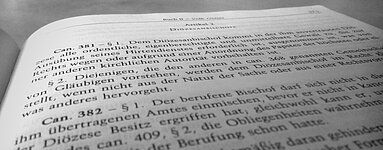Über den Lehrstuhl
Forschung
Informieren Sie sich über die Projekte des Lehrstuhls, Veranstaltungen und die Geschichte des Faches Kirchenrecht.
Studium
Erfahren Sie mehr über unsere Lehrveranstaltungen und Prüfungen. Finden Sie Informationen zu Abschlussarbeiten, zur Promotion, zur Bafög-Bescheinigung ... Klicken sie auch auf die Hinweise zu Kirchenrecht im Theologiestudium.

Lernen Sie das Team kennen.
Auf einen Blick
Veranstaltungen
Quick-Links
Katholisch-Theologische Fakultät (JMU Würzburg)
Fachschaftsvertretung Katholische Theologie
Freunde und Förderer der Katholisch-Theologischen Fakultät der JMU Würzburg e.V.
www.vatican.va (dt. Version)
www.iuscangreg.it (dt. Version)
Weitere nützliche Recherchetools und Rechts-Links finden Sie in unserer Linksammlung.
Information BAföG-Bescheinigungen (§ 48 BAföG)
Kanon des Monats

Kanonistische Einblicke in die Gesetzbücher der katho-lischen Kirche von verschiedenen Autoren. In jedem Monat wird ein Kanon unter die Lupe genommen mit spannenden Querverweisen und interessanten Hintergrundinforma-tionen.






